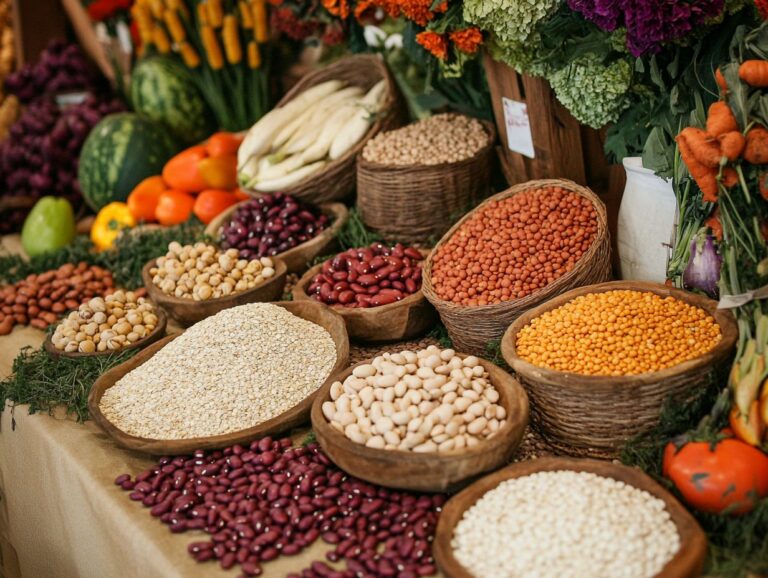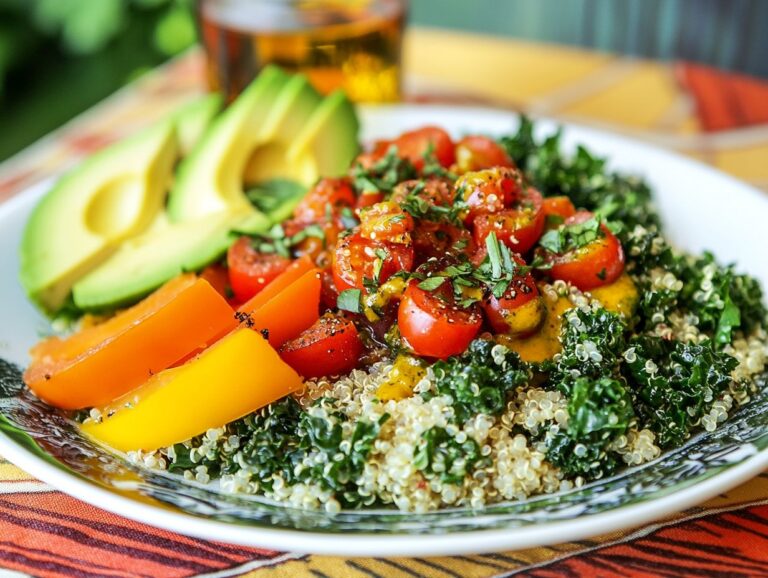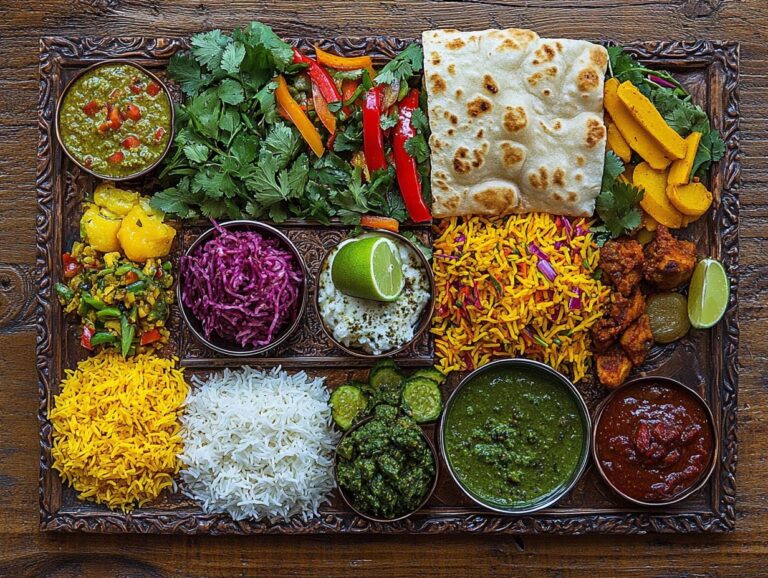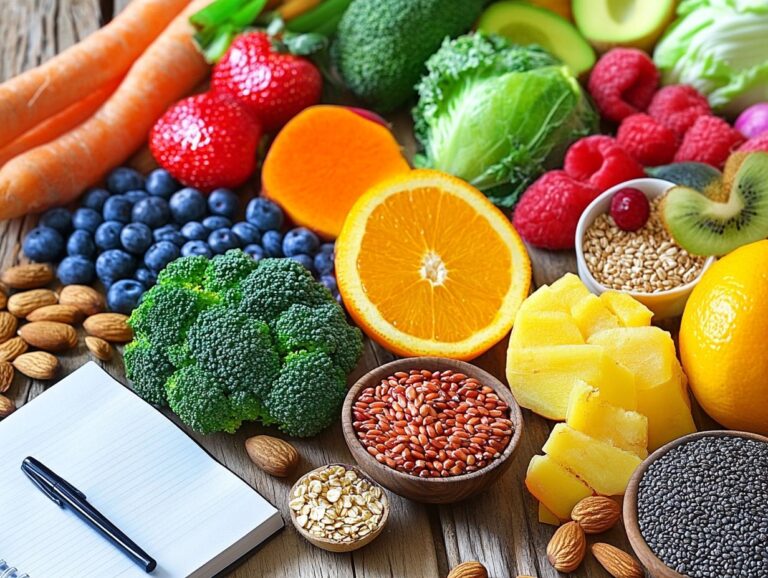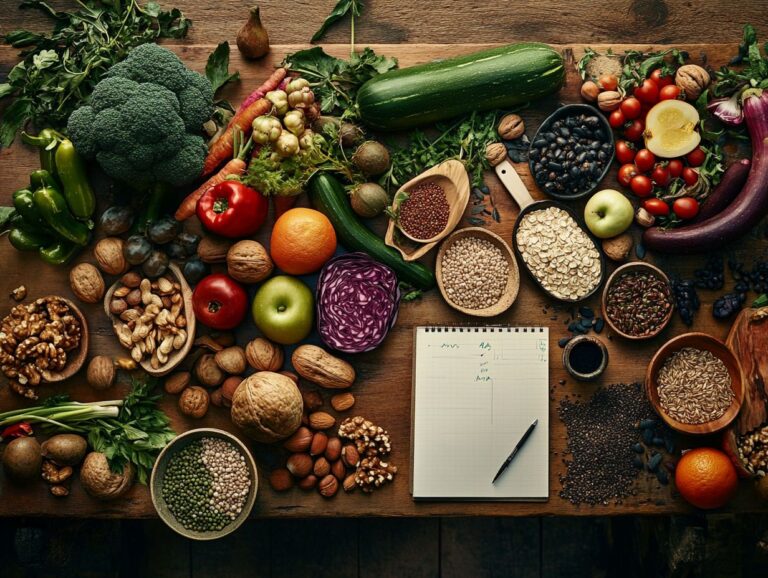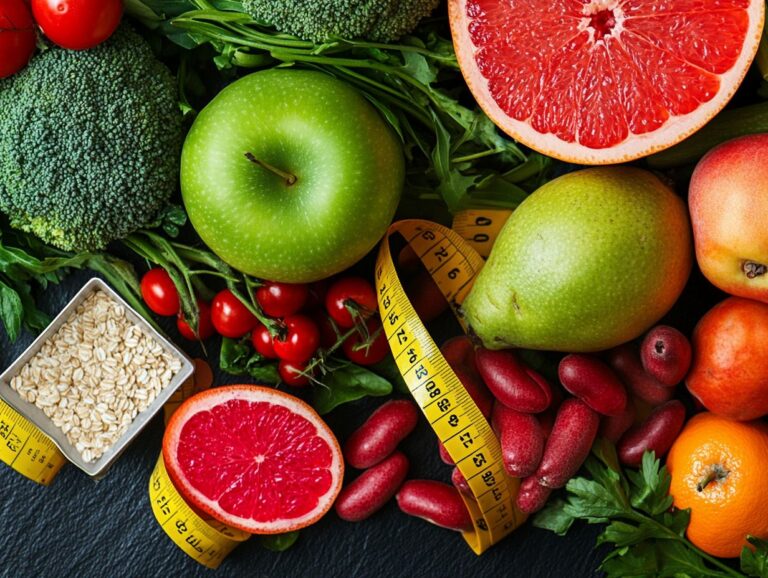Powerlifting has often been associated with meat-heavy diets; however, an increasing number of athletes are demonstrating that it is possible to build strength and muscle on a vegan or vegetarian diet. This article delves into the fundamentals of powerlifting, the principles of a vegan diet, and how these two worlds can coexist harmoniously. We will discuss the benefits and challenges that vegan powerlifters encounter, along with practical tips for meal planning, workout fueling, active recovery, and nutritional intake. Discover how plant-based nutrition, with its nutrient-rich food sources, can enhance your lifting performance!
Key Takeaways:
1.
- Powerlifting is a strength training sport that involves competing in three main lifts: squat, bench press, and deadlift.
2.
- A vegan diet is a plant-based diet that excludes all animal products. It can provide numerous benefits for powerlifters, such as improved cardiovascular health and reduced inflammation.
3.
- It is possible to do powerlifting on a vegan diet, but it may require careful planning and consideration of protein intake to ensure proper muscle building and recovery.
What is Powerlifting?

Powerlifting is a competitive strength sport where athletes strive to lift the maximum weight in three specific lifts: the squat, bench press, and deadlift.
To enhance their performance in these lifts, athletes engage in targeted training and often incorporate various training methods and nutritional strategies aimed at improving muscle strength, muscle growth, and overall strength performance.
The primary goal of powerlifting is to enable athletes to lift the heaviest weight possible in each category, showcasing their strength and skill while competing against other strength athletes.
The sport has gained significant popularity within the fitness industry, attracting many enthusiasts who seek to align their training practices with the principles established by Arnold Schwarzenegger and other icons like Nick Squires.
What is a Vegan Diet?
A vegan diet excludes all animal products, such as meat, dairy, and eggs. Instead, it is plant-based and emphasizes the inclusion of fruits, vegetables, legumes, whole grains, nuts, and seeds.
These foods provide numerous essential nutrients that help individuals maintain their health. Vegan diets offer several positive health effects, including improved heart health, a reduced risk of chronic diseases, and increased energy levels, which contribute to their growing popularity among athletes and bodybuilders.
Vegan athletes have demonstrated that it is possible to meet dietary needs and performance requirements through careful nutritional planning and the selection of appropriate nutrient-dense food sources.
Can You Do Powerlifting on a Vegan Diet?
Yes, powerlifting on a vegan diet is indeed possible. Many athletes have demonstrated that a well-planned plant-based diet can supply the necessary nutrition for muscle growth and strength performance.
When dietary changes are implemented correctly, individuals can ensure that their protein intake and fiber intake are adequate for their training and recovery. Vegan athletes often focus on high-protein foods such as legumes, tofu, tempeh, and plant-based protein powders to achieve their fitness goals.
What Are the Benefits of a Vegan Diet for Powerlifters?
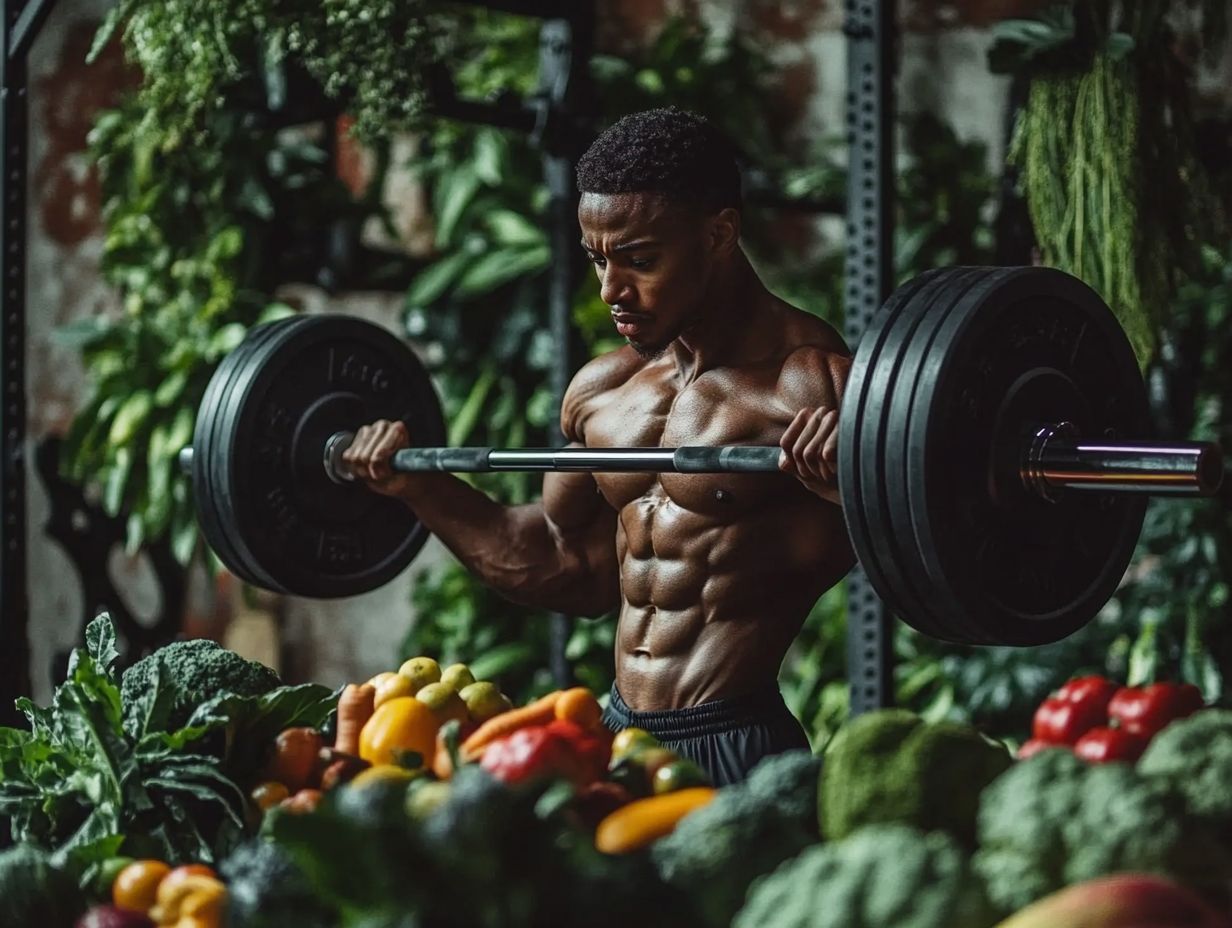
A vegan diet offers numerous benefits for powerlifters by providing essential nutritional inputs, adequate energy, and improvements in overall health through proper nutritional understanding. By emphasizing whole grains, legumes, fruits, and vegetables, a vegan diet supplies powerlifters with the necessary nutrition while reducing the intake of unhealthy fats and animal products, aligning with the bodybuilding diet principles.
The antioxidants and phytochemicals found in plant-based foods can aid in recovery and enhance muscle growth, making this dietary approach an appealing option for strength athletes striving to achieve their performance goals and exercise performance.
Furthermore, a plant-based diet promotes better recovery times through reduced inflammation and boosts energy levels, ensuring consistent performance during training routines.
Powerlifters may notice positive responses from their bodies due to the higher amounts of complex carbohydrates and protein-rich foods included in their diet, resulting in improved stamina and endurance.
Additionally, the abundance of vitamins and minerals in a vegan diet can enhance immune function, allowing athletes to maintain their health and training consistency.
As they embrace this lifestyle, powerlifters may find they can meet their muscle gain targets while reaping the many health benefits associated with a vegan diet.
What Are the Challenges of a Vegan Diet for Powerlifters?
While a vegan diet offers numerous benefits, powerlifters face specific challenges when transitioning to this lifestyle that must be carefully evaluated, such as maintaining caloric surplus and iron intake. The primary challenges include inadequate protein intake, maintaining a caloric surplus, and the risk of micronutrient deficiencies, including low fiber content.
Protein sources like beans and legumes often provide incomplete proteins, necessitating careful combinations to meet protein needs. Additionally, a caloric surplus is crucial for muscle growth, yet plant-based foods generally tend to be less calorically dense. Concerns about micronutrient deficiencies, particularly with iron and its absorption, as well as high fiber content affecting digestion and energy levels, are also significant, necessitating dietary supplements.
To address these challenges, powerlifters should adopt several strategies. They can consume a variety of protein-rich foods and protein sources, such as:
- Legumes
- Quinoa
- Fortified plant-based protein powders
Including nutrient-dense foods like nuts, seeds, and avocados can help meet caloric requirements and ensure proper caloric density. To mitigate concerns regarding iron levels and fiber content, powerlifters should incorporate iron-rich foods such as:
- Lentils
- Spinach
These should preferably be paired with vitamin C-rich foods, which enhance iron absorption. Additionally, dietary supplements for certain dietary nutrients, such as vitamin B12 and omega-3 fatty acids, can help compensate for any deficiencies that may arise in a vegan diet.
How to Build Muscle on a Vegan Diet for Powerlifting?
Building muscle on a vegan diet for powerlifting requires proper nutrition that includes a caloric surplus and adequate protein intake to support strength training, muscle mass development, and muscle growth.
Effective strategies involve ensuring sufficient protein in the diet, including protein shakes, creating efficient meal plans, and carefully calculating dietary needs.
Powerlifters can successfully build muscle on a vegan diet by consuming protein-rich foods such as whole grains, legumes, and tofu:
- Legumes
- Tofu
- Tempeh
- Whole grains
along with healthy fats and carbohydrates.
What Are the Best Vegan Protein Sources for Powerlifters?
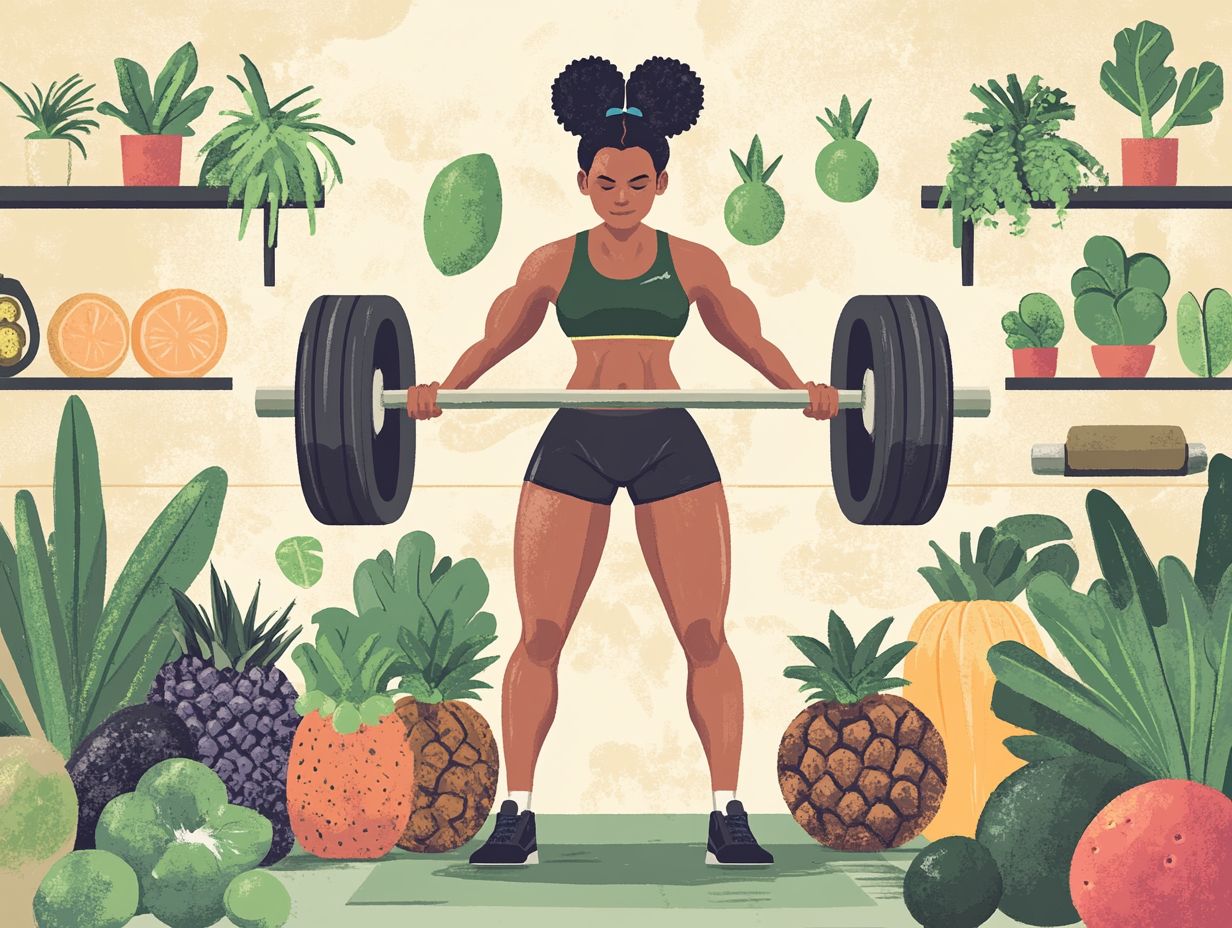
Powerlifters who follow a vegan diet can benefit from a variety of protein sources, many of which are similar to those used by other athletes.
Some of the top protein-rich foods and protein sources for powerlifters include:
- Legumes such as lentils, chickpeas, and beans
- Soy products like tofu, tempeh, and edamame
Incorporating multiple sources of protein helps ensure that powerlifters obtain all the essential amino acids necessary for optimal performance and recovery, fostering effective nutritional intake. Plus these staples, powerlifters can also benefit from including quinoa, hemp, and chia seeds in their diets.
Quinoa is particularly noteworthy as it is a complete protein source, containing all nine essential amino acids, suitable for both powerlifting and Olympic weightlifting. Utilizing plant-based protein sources not only aids in muscle repair but also adds beneficial ingredients such as fiber, healthy fats, and micronutrients, crucial for bodybuilding and strength performance.
Powerlifters can enhance their protein intake by using protein powders in smoothies, creating protein bars based on beans, or adding tofu to stir-fry meals. A greater variety of protein sources will provide a broader spectrum of amino acids, which are crucial for muscle repair and growth.
How to Create a Balanced Meal Plan for Powerlifting on a Vegan Diet?
A balanced meal plan for powerlifting on a vegan diet is a nutritional regimen designed to provide powerlifters with the specific dietary requirements necessary for strength athletes, ensuring proper caloric density. This plan includes a variety of foods that ensure an adequate supply of protein, carbohydrates, and healthy fats in the proper proportions to meet caloric and nutritional goals.
By fulfilling the caloric and nutritional needs of powerlifters, a balanced vegan meal plan helps optimize performance and supports goals related to recovery, muscle gain, or muscle mass retention.
To create an effective balanced meal plan for powerlifting on a vegan diet, it is essential to determine the macronutrient ratios that align with the individual training goals of the powerlifter. Typically, these ratios consist of higher protein, moderate carbohydrates, and healthy sources of fat. These macronutrient ratios are then distributed into appropriately sized meals throughout the day, aligning with effective meal planning.
For example, a balanced meal might prominently feature:
- quinoa with black beans
- sweet potato
- tahini
Consumed after a workout, this meal provides approximately 600 kcal of energy, 30 g of protein, 90 g of carbohydrates, 20 g of healthy fats, and 15 g of fiber. The combination of protein and complex carbohydrates in this meal supports both energy levels and muscle repair, enhancing overall dietary changes.
As with any well-rounded diet, it is crucial to incorporate a variety of food choices to ensure a broad range of nutrients, including antioxidants and phytochemicals, while also making the diet enjoyable and sustainable in the long run. Snack options could include:
- almond butter spread on whole-grain bread
- a power smoothie made with spinach, banana, and pea protein powder
How to Fuel Your Workouts on a Vegan Diet for Powerlifting?
The most effective way to fuel workouts on a vegan diet for powerlifting is through proper nutrition, which involves consuming nutrient-dense foods that enhance energy levels, support recovery, and meet all dietary needs without relying on animal products.
Adequate nutrition before and after workouts can significantly impact performance, muscle gains, and strength performance.
Pre-workout snacks should contain a balanced mix of carbohydrates and protein, while post-workout meals should focus on protein-rich foods, healthy fats, and a caloric surplus to replenish glycogen stores and aid in recovery.
What Are the Best Pre-Workout Snacks for Vegan Powerlifters?
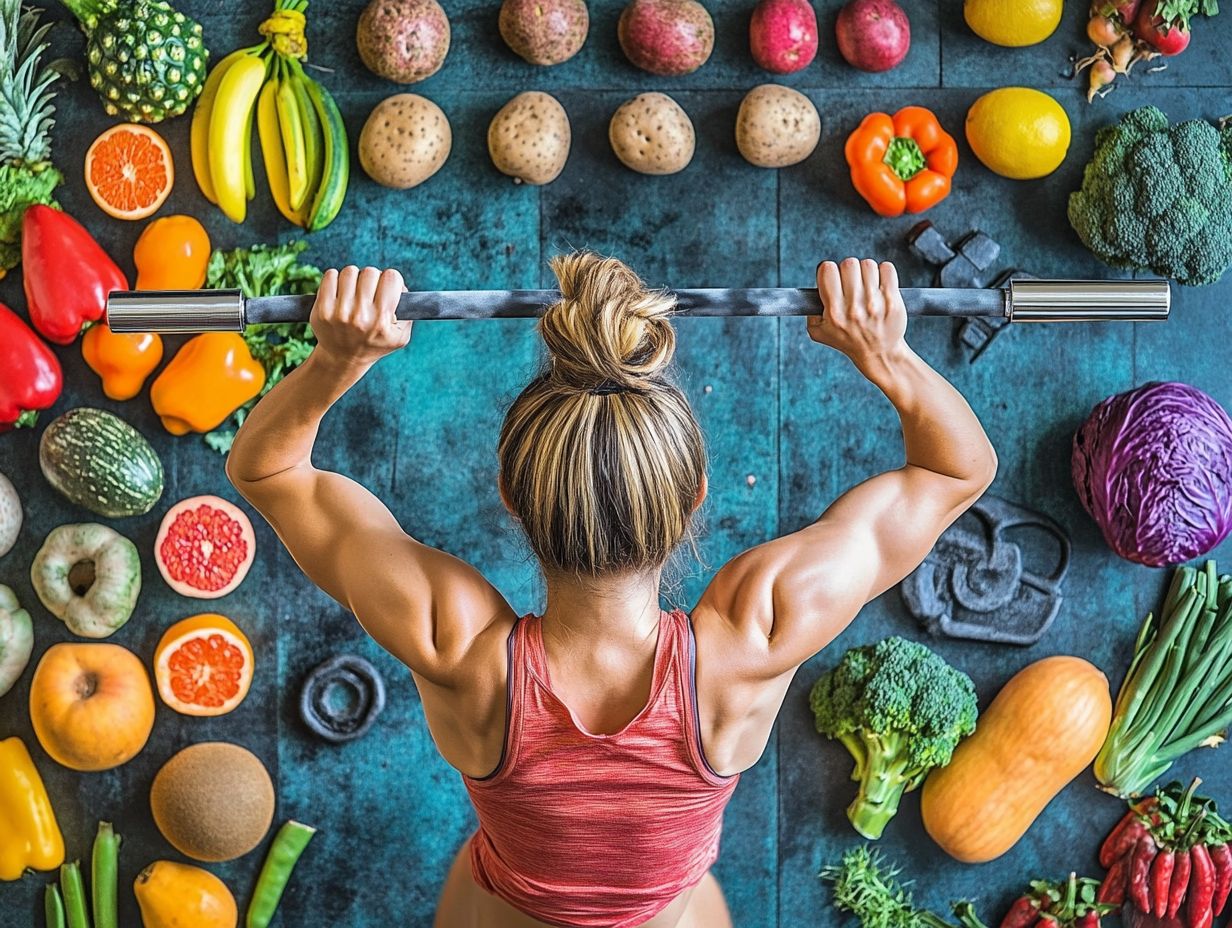
The best pre-workout snacks for vegan powerlifters are those that enhance energy levels, provide the necessary fuel for high-intensity training sessions, and support overall muscle growth.
Examples include:
- Whole grain toast with almond butter, offering a good source of fiber and healthy fats
- A banana with peanut butter
- A smoothie made with plant-based protein powder and fruits
These snacks deliver the carbohydrates and protein essential for optimizing performance. The carbohydrates help maintain energy during workouts, while the protein supports muscle strength and muscle mass development.
Additionally, energy-dense foods such as oatmeal with chia seeds or a handful of trail mix can enhance powerlifting performance by supplying essential vitamins, minerals, and micronutrients.
Vegan powerlifters can also benefit from nutrient-dense options like hummus with whole-grain pita or edamame, which provide protein, aid in muscle recovery after training, and contribute to meeting protein intake goals.
Overall, these snacks are designed to maximize complex carbohydrates for sustained energy while meeting protein requirements, ultimately boosting the intensity, endurance, and exercise performance of workouts.
What Are the Best Post-Workout Meals for Vegan Powerlifters?
The best post-workout meals for vegan powerlifters are those that provide adequate protein and carbohydrates to support recovery, promote muscle building, and account for necessary dietary supplements. These meals assist in replenishing the energy stores that are depleted during intense training sessions.
Foods containing plant-based protein, such as lentils and beans, contribute to muscle repair, while complex carbohydrates and whole grains offer a steady release of energy.
An excellent recovery meal consists of a large bowl of brown rice topped with steamed broccoli and a generous portion of roasted chickpeas. Additionally, a smoothie made with almond milk, spinach, banana, and a scoop of vegan protein powder is both delicious and packed with the essential nutrients needed for recovery.
By incorporating these nutrient-rich foods, vegan powerlifters can effectively enhance their workout performance, aid in athletic recovery, and meet their nutritional intake requirements.
How to Recover Properly on a Vegan Diet for Powerlifting?
A proper vegan diet is essential for powerlifting recovery, as it helps in gaining muscle, maintaining energy levels, and enhancing overall performance.
Recovery for powerlifters involves not only adequate rest but also the consumption of recovery foods that supply vital nutrients necessary for replenishment and recovery.
Incorporating a diverse range of plant-based foods rich in antioxidants, proteins, healthy fats, and phytochemicals can significantly optimize the recovery process.
What Are the Best Vegan Recovery Foods for Powerlifters?
The best vegan recovery foods for powerlifters are those that provide a balance of protein, healthy fats, and carbohydrates, all of which support muscle recovery, replenish energy stores, and contribute to the overall caloric density needed for recovery.
Ingredients like chickpea salads, nut butters spread on whole grain toast, and smoothies made with bananas and spinach can effectively meet the nutritional needs of powerlifters, ensuring they receive adequate fiber intake and protein sources. Vegan recovery foods are essential for maintaining the health and performance of athletes who follow this lifestyle.
Foods such as:
- quinoa
- lentils
- hemp seeds
significantly enhance protein intake, which is crucial for muscle recovery as they contain the amino acids necessary for repairing muscle tissue and supporting muscle growth. Avocados offer heart-healthy fats that contribute to overall recovery.
Additionally, sweet potatoes and brown rice are excellent sources of complex carbohydrates that help replenish glycogen stores following exercise. By consuming a variety of these nutrient-rich recovery foods, athletes can ensure they meet their nutritional requirements for both physical recovery and energy restoration, aligning with their performance goals.
What Are the Best Vegan Supplements for Powerlifters?
The best vegan supplements for powerlifters on a plant-based diet can provide essential nutrients, such as iron intake and vitamin B12, that may be lacking or insufficient for optimal performance.
Protein powders derived from legumes or brown rice can enhance recovery time after workouts and offer a complete amino acid profile necessary for muscle building.
Vitamin B12 is another crucial supplement, as it aids in carbohydrate metabolism—carbohydrates being the primary energy source for athletes—and plays a significant role in red blood cell production and overall nutritional planning.
Iron is also vital, as it supports the body’s ability to transport oxygen and has been shown to improve workout stamina, endurance, and overall strength training performance.
These nutrients ensure that powerlifters do not miss out on important dietary components, helping them maintain their strength during intense workouts and align with their bodybuilding diet.
What Are Some Successful Vegan Powerlifters?
Numerous successful vegan powerlifters have demonstrated the effectiveness of plant-based diets in the fitness arena. This group includes athletes who had thriving powerlifting careers before adopting a vegan lifestyle, as well as those who have achieved success solely as vegan competitors. Regardless of their dietary history prior to going vegan, these athletes’ experiences have showcased the ability to maintain or even gain strength and muscle mass on a vegan diet, inspiring others to follow suit.
Stereotypes surrounding vegan diets often suggest that individuals will struggle to lift heavy weights or maintain their strength. However, these powerlifters, alongside advocates like Nick Squires, have dispelled that myth through their impressive accomplishments. Many profiles focus solely on their lifts in kilograms, which can make it challenging for those outside the sport to appreciate their achievements. The tables below convert these weights into pounds, providing a clearer understanding of how successful these athletes have been in their sport, much like the documentary “The Game Changers” did for vegan athletes.
- 288 kg (635 lb): Total (117.5 + 145 + 25) – All-time world record in Superheavyweight (2015), including the heaviest squat, deadlift, and total powerlift ever by a vegan athlete.
- 245 kg (540 lb): All-time heaviest deadlift ever by a vegan.
- 208 kg (459 lb): All-time heaviest squat ever by a vegan.
- 116 kg (256 lb): Competition powerlifting bodyweight.
- 231 kg (510 lb): Competition powerlifting bodyweight.
- 134 kg (295 lb): Competition powerlifting bodyweight.
- 147 kg (324 lb): Competition powerlifting bodyweight.
- 138 kg (304 lb): Competition powerlifting bodyweight.
- 179 kg (393 lb): Competition powerlifting bodyweight.
- 135 kg (298 lb): Competition powerlifting bodyweight.
- 146 kg (321 lb): Competition powerlifting bodyweight.
- 185 kg (407 lb): Competition powerlifting bodyweight.
- 130 kg (287 lb): Competition powerlifting bodyweight.
- 110 kg (242 lb): Competition powerlifting bodyweight.
- 126 kg (277 lb): Competition powerlifting bodyweight.
- 146 kg (321 lb): Competition powerlifting bodyweight.
- 155 kg (342 lb): Competition powerlifting bodyweight.
- 168 kg (370 lb): Competition powerlifting bodyweight.
- 147 kg (324 lb): Competition powerlifting bodyweight.
- 133 kg (293 lb): Competition powerlifting bodyweight.
- 179 kg (393 lb): Competition powerlifting bodyweight.
Some notable vegan powerlifters include:
- Kenneth ‘Ken’ D. G. Anderson (Australia)
- Thomas ‘Tom’ P. M. C. Ross (Belgium)
- Bruno B. H. T. G. C. M. Struyf (Brazil, Belgium)
- Stuart ‘Stu’ G. L. H. A. D. W. C. McKenzie (Australia)
- Katherine ‘Katie’ F. M. S. A. M. Y. C. D. M. C. C. McKenzie (Australia)
- Anastassia ‘Nastya’ M. K. P. C. L. C. P. K. H. D. M. G. D. M. C. Shaw (Kazakhstan)
- Anzhelika ‘Zhenya’ P. K. I. C. L. C. P. K. H. D. M. G. D. M. C. Shaw (Kazakhstan)
- Ty ‘Tyke’ J. L. M. C. L. C. P. K. H. D. M. G. D. M. C. Shaw (Kazakhstan)
As these powerlifters and others like them share their successes, they encourage fellow athletes to explore vegan options in their training and recovery regimens, inspiring dietary changes to enhance strength athletes’ performance.
